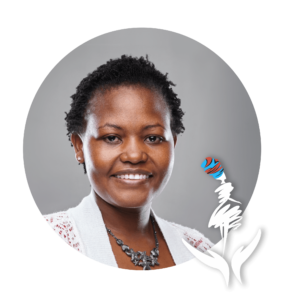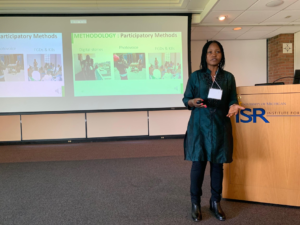 Dr. Elizabeth Kimani-Murage is a Senior Research Scientist at the African Population and Health Research Center (APHRC), and a Wellcome Trust International Engagement Fellow. More recently, she joined Vitamin Angels as a member of their board of directors.
Dr. Elizabeth Kimani-Murage is a Senior Research Scientist at the African Population and Health Research Center (APHRC), and a Wellcome Trust International Engagement Fellow. More recently, she joined Vitamin Angels as a member of their board of directors.
She is an adjunct Assistant Professor at Brown University, USA and an honorary lecturer at the University of Glasgow, UK. She is a Public Health Specialist/Public Health Nutritionist, leading the Maternal and Child Wellbeing Unit at APHRC. She holds a PhD in Public Health (2010), specializing in Nutrition; a Masters of Public Health (2004) specializing in epidemiology and disease control; and a Bachelor of Science degree in Environmental Health (1999). She has a cumulative work experience of 15+ years (~ 10 years post-doctoral).
You have worked for a number of organisations, have you ever faced challenges due to your gender?
I have not really faced challenges due to my gender per se. But of course as a woman you probably must work harder and faster for a rainy day because the biological differences with men make us different — nature does not in itself “equalize” men and women. For example, when I finished my doctoral studies, I knew I really wanted to get the highly envied Wellcome Trust postdoctoral training fellowship immediately to catalyse my career PATH – as I wanted to be focused (the fellowship pays 100% of your salary and provides money for a project of your choice and mentors to help you chart your career PATH). However, around the time I needed to apply for the fellowship I went on maternity leave – I had to work on the proposal during my maternity leave as I nursed the baby. Women often must double- or multi-task!
Additionally, just before I re-joined APHRC after my PhD, I conceived. Despite the fact that I knew APHRC was an equal opportunity employer, I felt a little uneasy that I was looking for a new job while I was pregnant and wondered if they might feel cheated when they discovered that I was actually pregnant when they hired me (not really sure why this concerned me) – I had to disclose to the HR before I signed the contract so that they could make an informed decision whether to hire me or not.
What experience are you most proud of?
I will always be proud of my first-led research – the study I conducted in an Eldoret slum as a student (read more in Part 1). I believe it was impactful and made me feel great!
I also look back to my Wellcome Trust postdoctoral fellowship with a lot of admiration. It helped me chart my career path as a researcher. I was able to create a niche for myself as a researcher, publish a lot of papers and influence! I wrote a blog about my experience with the fellowship which can be accessed here.
Women have a special strength and ability! They do what they do with a lot of passion! They therefore can transform Africa! - Dr. Elizabeth Kimani-Murage. Click To Tweet
What is your greatest regret?
I must scratch my head on this because all along, what may have seemed as a missed opportunity or a bad choice has often tended to be a blessing in disguise. But all the same, when I look back, I sometimes think I made wrong subject choices when moving to form three in high school. Unfortunately, the education system changed abruptly, and we were forced to drop some subjects that were usually not dropped and make a choice of 8 subjects rather than take 10 subjects for the Kenya Certificate of Secondary Examination (KCSE). Through either lack of appropriate mentorship or bad advice, I chose all the “hard” subjects – I chose to take all the three sciences (Biology, Chemistry, Physics) and geography – I dropped the “soft” subjects like CRE (Christian Religious Education). This made it difficult to attain the grade I had hoped to attain to do what I would have preferred to do.
I grew up with a desire to do law – to promote access to justice for people — As I was growing up there was apathy with the legal justice system. My mum always told me I would be a judge when I grew up – She thought I made decisions like a judge – Probably at the back of her mind she saw a solution to the problem of access to justice that she and my dad and people around were experiencing – My dad was involved in a land legal case for all my childhood – and this may have contributed to the apathy among my neighbours – they never wanted to think about pursuing the court justice system. On the other hand, other people thought I should become a medical doctor… as they thought I had characteristics of a doctor (although when I was on campus my classmates thought I should have pursued nursing –they thought I had nurturing characteristics).
So, as I was growing up, I was a little confused but I wanted to do one of the two – law or medicine — and being one of the brightest minds in my world, the sky seemed the limit! At the back of my mind I thought I would want to deal with people and help them out. I ended up being admitted for an undergraduate course that was like pseudo-medicine – public health – based in a medical school. While public health may not be what I had conceived, it ended up being a blessing in disguise. It exposed me to vulnerabilities of poor people. At the University where I undertook my undergraduate studies, we were exposed to an innovative system called “Community Based Education System – COBES” where we were attached to a community for several weeks to understand their social and health system. During this exposure I always thought I wanted to make a change in the lives of poor people. Little did I know it was going to be through research! Public health research has exposed me to so much – It has helped me to understand and appreciate vulnerabilities in a deeper and wider way – more than a course like medicine or law, both which deal with individuals rather than the public could have done! I am now best placed to change the world for poor and vulnerable people. I want to promote justice for poor and vulnerable people – I want to promote social justice – I have no regrets!
What, in your opinion, are the biggest opportunities for women in health on the African continent?
Women have a special strength and ability! They do what they do with a lot of passion! They therefore can transform Africa! The sky is the limit for them!

Have you ever been mentored, if so by whom?
Throughout my career, I have been mentored. I had great mentors during the Wellcome Trust postdoctoral training fellowship who mentored me on the subject matter (nutrition research) and research processes including data management, scientific writing, fund raising.
Additionally, my long-term supervisor at APHRC (since I re-joined after my PhD) has been my greatest career mentor. I have always learnt a lot from her – especially regarding decision making, delegation, management – name it! I have always admired her style of management and leadership.
What is the value of mentorship in your opinion?
Mentorship has made me! — I have always learnt so much from my mentors! They have guided me, encouraged me and helped me in decision making. Mentorship makes you a better person!
What is the best advice you have ever received?
As I was growing up, my mum always used to advise me “nothing good comes along easily” – one must work hard to get that which is good or what they want … This has always carried me along – even along my career path. For example, when I went to South Africa for PhD studies, I had to leave my young family behind. I had to work extra hard to complete the PhD in record time – As I stayed up late through the night, I always remembered my mum’s words – This gave me an impetus to go on and on.
We love stories and would love to hear from you! If you were inspired by Dr Elizabeth Kimani-Murage’s story and would like to share your own story, or nominate an African woman in health, please send us an e-mail at: info@pawh.org.

Leave a Reply